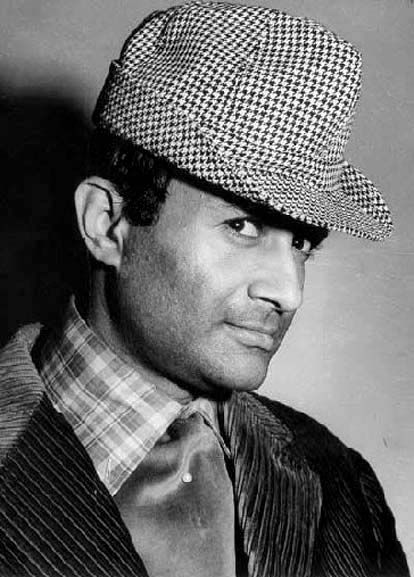
The importance of being Dev Anand
, Source: Hindustan Times
  |
| Pradeep |
 Dec 22 2003, 09:41 AM Dec 22 2003, 09:41 AM
Post
#1
|
 Dedicated Member  Group: Admin Posts: 6844 Joined: 20-October 03 Member No.: 2 |
A fair reappraisal of evergreen star Dev Anand’s contribution to popular Hindi cinema has been long overdue. The Dadasaheb Phalke Award conferred on him this year may be confirmation of his stature of a film professional, but the honour by itself does not quite convey the sheer range and magnitude of his work spread over six eventful decades.
Dev Anand’s place in the pantheon of Bollywood greats should logically be as assured as that of his illustrious contemporaries, Dilip Kumar and Raj Kapoor. Indeed, Navketan Productions, the company that Dev Anand launched in 1949 with the collaboration of elder brother Chetan Anand, took greater calculated risks and pushed more creative envelopes than any contemporary production outfit. For this critic, the two definitive Dev Anand films – Guide (which was directed by younger brother Vijay Anand) and Hare Rama Hare Krishna – dared to rewrite many of commercial Hindi cinema’s well-established ground rules. In Guide, made in 1965, not only do we confront a heroine who breaks free from her archaeologist husband and lives with another man, a fast-talking tourist guide, in order to realize her ambition as a dancer, we also encounter a hero who thinks nothing of jettisoning conventional moral codes in his undisguised pursuit of wealth. The exploration of two fully-rounded individuals as they grapple with inner emotional conflicts and undeniable external truths – the tale was of course based on an R.K. Narayan novel written in English -- had a level of maturity that mainstream Hindi cinema of the time could rarely, if ever, achieve. The energy of the creative maverick that Dev Anand has always been shone through bright and clear in Guide and it is a spirit that has guided his best films all along. The 1971 Dev Anand hit, Hare Rama Hare Krishna, presented the character of a sister who flouted every piece of wisdom engraved in the Bollywood black book. A victim of a broken home, she is inveigled by the drug-induced reveries of a band of hippies. Within the popular Hindi film formula, the hero’s sister is meant to be lily white and spotlessly pure, not a rebellious spirit who strays into morally dodgy territory of her own accord. But Dev Anand wasn’t one to be hemmed in by what had gone before. For that reason, as well as many others, the Navketan brand is, indeed, as important as R.K. Films. If it hasn’t quite got its due in terms of recognition, the fault lies with the way Dev Anand has approached his creative endeavours over the years. He completes one film, releases it and moves on to a new film almost immediately. Promotion, either of the self or a film, has been alien to his worldview. While the pitfalls inherent in that methodology are obvious – Dev Anand has continued to foist one ordinary film after another on moviegoers during the past couple of decades unmindful of popular rejection – it has worked as a fortification against any form of debility and doubt, enhancing his longevity as a filmmaker and actor for better or for worse. The quality of his work may have dipped dramatically over the years – the Dev Anand of Kala Bazaar, which dealt with institutional corruption way back in 1958, may be barely recognizable for those who see him in Love At Times Square, which tells a story of youthful amour that revolves around 9/11 -- but his intrepidity in the face of heavy and mounting odds captures the continuity of an exemplary enterprise that has managed to stay above the pulls and pressures of the market in a strange, inexplicable sort of way. Dev Anand has always been a creature of the mainstream Mumbai film industry and yet he has rarely played the game by the rules laid down by it. He has always set his own pace, worked with newcomers on virtually every film he has made, given men like Guru Dutt, Raj Khosla, Vijay Anand, S.D. Burman, R.D. Burman and Sahir Ludhianvi the openings they deserved and, above all, he has been a classic Bollywood visionary who has constantly stayed a step or two ahead of the times. The Phalke award is only incidental, Dev Anand does deserve to be rescued from the footnotes of Bollywood history anyway and placed alongside the Dilip Kumars and Yash Chopras of the world. The process, thankfully, may have just begun. Attached image(s) 
kuch bhi nahin hai tera mol, boli na badi bol, khilona tu maati ka...
|
  |
2 User(s) are reading this topic (2 Guests and 0 Anonymous Users)
0 Members:

|
Lo-Fi Version | Disclaimer | HF Guidelines |  |
Time is now: 14th May 2024 - 11:42 PM |
Invision Power Board
v2.1.7 © 2024 IPS, Inc.
Licensed to: Hamaraforums.com








